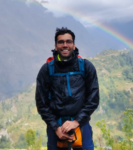Bloodbath in Moscow: ISIS-K Delivers Shocking Blow to Heart of Russia

View of the burning Crocus City Hall concert venue following a shooting incident, outside Moscow, Russia, on March 22, 2024 [Yulia Morozova/Reuters]
The ISIL (ISIS) group has claimed responsibility for a brazen attack on Moscow’s Crocus City Hall that killed at least 60 people and injured more than 145. The prosecutor’s office said several men in combat fatigues had entered the concert hall, about 20km (12 miles) from the Kremlin and next to the Moscow ring road, and fired on those inside. The United Nations Security Council “condemned in the strongest terms the heinous and cowardly terrorist attack” in Krasnogorsk.
A horrific attack on Friday night in Moscow has left the world reeling. At least 60 people were killed and 145 injured when gunmen stormed the Crocus City Hall concert venue, targeting a performance by the popular rock band Picnic. The Islamic State in Khorasan Province (ISKP), a brutal affiliate of the Islamic State (ISIS), has claimed responsibility, marking a dramatic escalation in the group’s global reach and a direct challenge to Russian President Vladimir Putin.
The attack unfolded with horrifying swiftness. Witnesses described five heavily armed men, clad in camouflage, bursting into the packed concert hall. Bullets ripped through the crowd, followed by the detonation of explosives. Panic erupted as fire quickly engulfed the venue, filling the air with smoke and screams. In a desperate scramble for the exits, a witness reported a “terrible crush” as concertgoers fought for escape, some trampled in the chaos.
ISIS, through its Telegram channel, claimed responsibility for the attack, stating their fighters targeted “a large gathering” on Moscow’s outskirts and managed a clean escape. The group has a well-documented history of violence, responsible for numerous attacks within and beyond Afghanistan. Notably, ISKP claimed responsibility for the suicide bombing at the Russian embassy in Kabul last September, demonstrating a clear intent to target Russian interests.
While the attack represents a significant escalation, experts believe it’s not entirely unexpected. Michael Kugelman, a scholar at the Washington D.C.-based Wilson Center, noted that ISKP has long harbored grievances against Putin, viewing Russia as complicit in “activities that oppress Muslims.” Additionally, the group’s ranks include a significant number of Central Asian fighters with their own historical grievances against Moscow.
The attack raises critical questions about intelligence sharing and potential lapses in security. The White House confirmed that the United States warned Russian authorities earlier in March of a possible terrorist attack targeting “large gatherings” in Moscow, potentially including concerts. This raises concerns about the effectiveness of Russia’s response or whether the specific threat regarding Crocus City Hall was missed.
The attack throws Moscow’s security apparatus and Putin’s leadership into sharp focus. Public anger and a sense of vulnerability are likely to simmer, particularly with the memory of the deadly 2010 Moscow Metro bombings still fresh in many minds. The Kremlin has vowed a “terrorist” investigation and President Putin is said to be receiving constant updates.
The international community has responded with condemnation of the attack. Ukraine and the Freedom of Russia Legion, a pro-Ukrainian militia, have both denied any involvement. The Biden administration has reiterated its commitment to the “duty to warn” policy, highlighting its efforts to share intelligence with Russia about potential threats.
The long-term implications of the attack remain to be seen. It signifies a worrying expansion of ISIS-K’s operational reach and a potential shift in tactics towards striking outside of Afghanistan. For Russia, the attack lays bare vulnerabilities in security measures and underscores the complexities of navigating an ever-evolving global terror landscape. As the investigation unfolds, the world will be closely watching Moscow’s response and the potential for further retaliation against ISKP. The attack in Moscow has served as a stark reminder of the ongoing threat of terrorism and the urgent need for international cooperation in combating violent extremism.
Team Profile

- News Writer
- Shubham Chakraborty, a Freelance Writer, holds an MBA from XLRI and boasts 6.5 years of extensive corporate experience. Departing from his corporate path, he embarked on a journey to fulfill his childhood dream of focusing on writing.
Latest entries
 English12 May 2024US Likely to Impose 100% Tariff on Electric Vehicle Imports from China
English12 May 2024US Likely to Impose 100% Tariff on Electric Vehicle Imports from China English26 March 2024UN Security Council Demands Immediate Ceasefire for the First Time Amidst Ongoing Israel-Gaza Conflict
English26 March 2024UN Security Council Demands Immediate Ceasefire for the First Time Amidst Ongoing Israel-Gaza Conflict English23 March 2024Bloodbath in Moscow: ISIS-K Delivers Shocking Blow to Heart of Russia
English23 March 2024Bloodbath in Moscow: ISIS-K Delivers Shocking Blow to Heart of Russia English20 March 2024A Hollow Victory: Putin Claims Landslide in Russian Election and Scorns US Democracy
English20 March 2024A Hollow Victory: Putin Claims Landslide in Russian Election and Scorns US Democracy









